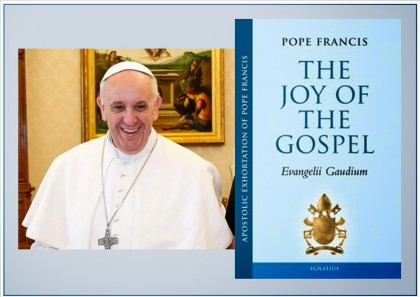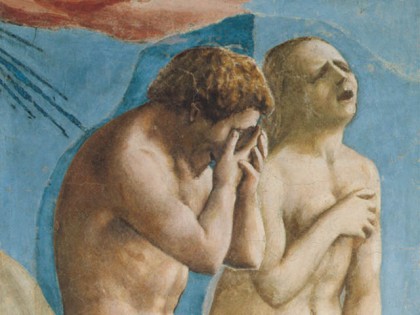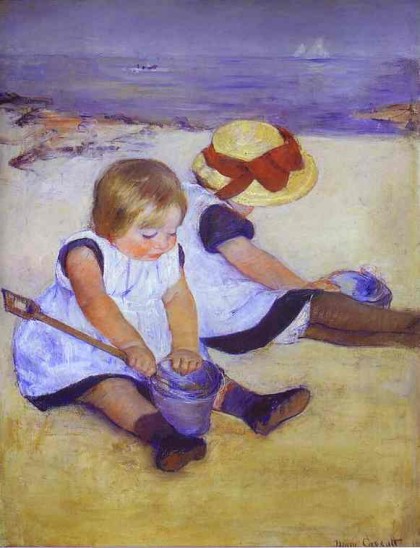Evangelizing the Complacent
Devra Torres | Dec 22, 2013 | 9 cmts

Scarcely had I waded past the first paragraph of Evangelii Gaudium when I came across a very odd sentence.
It wasn’t about trickle-down economics, and it wasn’t about the salvation of atheists (although I just heard a good line about that: the question is not so much whether those who reject the Gospel can be saved, but whether we can be saved if we don’t preach it).
No, this was not about the usual bones of contention. The odd sentence was this:
The great danger in today’s world, pervaded as it is by consumerism, is the desolation and anguish born of a complacent yet covetous heart, the feverish pursuit of frivolous pleasures, and a blunted conscience.
Wait, what? How can you be complacent and full of desolation and anguish? What was he talking about?
I think it’s the flip side of a very familiar coin. Just as deep joy can coexist with transient suffering, chronic anguish can coexist with outward complacency.

We distinguish between two kinds of happiness: On the one hand, authentic joy, its roots sunk deep in reality, which arises from being in harmony with the truth about the person and his Creator. On the other, something more superficial: “physiological good spirits—the happiness of a healthy animal,” in St. Josemaria Escriva’s phrase.
The deeper joy is perfectly compatible with suffering and hardship. The surface cheer, on the other hand, is at the mercy of circumstances, ebbing and flowing with the vicissitudes of finances, hormones, weather, digestion, and the decisions of other people.
Christians have been trying to get the message of real joy across for a long time. Many remain unconvinced. What’s so attractive about a happiness that doesn’t feel good? What’s so terrible about physiological wellbeing?

Joy that coexists with suffering and hardship has proven to be a hard sell with people who would just as soon take a pass on the arduous adventure of seeking their telos. In C. S. Lewis’ famous words,
We are half-hearted creatures, fooling about with drink and sex and ambition when infinite joy is offered us, like an ignorant child who wants to go on making mud pies in a slum
because he cannot imagine what is meant by the offer of a holiday at the sea.
It’s true, the complacent don’t sense a need for forgiveness. Janet Smith pointed this out in “Are We Obsessed?” her response to Pope Francis’ cautions against an out-of-context emphasis on sexual teachings. Fr. Dwight Longenecker made a similar point the other day in “Mercy? Who needs it?”

How does one communicate the joy of the gospel to those who, sated by their materialistic pleasures, do not perceive sadness in their lives? How does one offer forgiveness to one who does not believe they have done anything wrong? How does one offer healing to one who does not believe they are sick? How does one offer mercy to those who have no idea that they need mercy?
He’s right: lots of us don’t appreciate the good news because we’ve never really absorbed the bad news—the part about being fallen, helpless, and headed for hell.

But look at what Pope Francis might be suggesting here. Maybe even the most (outwardly) complacent sense that something is very wrong. How many people do you know who suffer from depression? From anxiety? From addictions to food, drugs, pornography, smartphones? There are many who, granted, don’t see themselves as sinners but who are not truly “sated by their materialistic pleasures.” If they were really so self-satisfied, why would they fall for the offerings of Oprah, or scientology? Why would they treat environmentalism, or nutrition, or politicians like little gods?

Maybe complacency isn’t the word. Maybe it’s inertia, or a kind of chronic, low-grade despair—despondency at our own inability to be convinced that anything will ever change for the better.
Here’s Francis’ diagnosis:
Whenever our interior life becomes caught up in its own interests and concerns, there is no longer room for others, no place for the poor. God’s voice is no longer heard, the quiet joy of his love is no longer felt, and the desire to do good fades.
If this is true--if, at least sometimes, the "complacency" is a surface phenomenon--then maybe there is an opening after all. We don't need to choose between a 1970's-style accomodation to vacuity, glossing over the "hard sayings," or else wandering aimlessly around in the futile attempt to peddle truth and morality to an audience who sees them as unnecessary inventions.

What do you think? Have you tried different approaches with the complacent? How deep did their complacency run? Has anyone ever shaken you out of your complacency? How did they do it? What didn't work? What backfired?
And maybe next time we'll get to economics and salvation.




Comments (9)
Sapperdepitjes
Dec 22, 2013 5:25pm
To be content with your life = to have it filled with meaningful content in harmony with truth.
Katie van Schaijik
Dec 23, 2013 4:45am
I don't have answers to your questions, Devra, but I definitely feel the problem. I like this formulation a lot:
What's been interesting for me to observe lately is that it doesn't just seem to me the case that Christians are having a hard time communicating their saving message to non-believers; they're having a hard time experiencing it themselves.
In other words, as the exhortation makes plain, we have a serious joy deficit among Christians too. We may believe it all, and yet struggle to experience it.
I'm trying to grasp the Pope's meaning here. I see it's connected with openness to others and to the poor.
But I feel like I'm missing something. Help.
Marie Meaney
Dec 23, 2013 7:18am
"What's been interesting for me to observe lately is that it doesn't just seem to me the case that Christians are having a hard time communicating their saving message to non-believers; they're having a hard time experiencing it themselves. "
That's a good question/point, Katie. This makes me think of Simone Pacot’s book « L’Evangelisation des profondeurs » (http://www.amazon.fr/LEvangélisation-profondeurs-Simone-Pacot/dp/2204057371/ref=sr_1_1?ie=UTF8&qid=1387800755&sr=8-1&keywords=simone+pacot) which I read some years ago (it’s been translated into German, but not into English unfortunately) (her assocation’s website can be found here http://www.bethasda.org/index.php/fr/; she associates spirituality with psychology and has great success in France). Her approach is that we accept and live our faith on a certain level, but fail to let it inform our deeper layers. Hence we suffer from many psychological and other ailments, since we haven’t let Christ come into our brokenness, who would make us able to embrace our cross fully. Without this, we cannot carry it with a spirit of joy and thus are hardly different from our pagan friends. Like them we have our idols, which are supposed to fill the emptiness inside, but leave us dissatisfied and depressed instead. Unfortunately they block the way for God, yet leave us empty.
Sapperdepitjes
Dec 23, 2013 8:01am
I remember having read somewhere a comment from a mystic saying that Jesus was perfectly happy while cruely suffering on the Cross...
Devra Torres
Dec 26, 2013 8:17pm
Sapperdepitjes, yes, there are many aspects and levels of being content, or joyful, or fulfilled, or (in von Hildebrand's terms) "subjectively satsfied" that would be worth going into more deeply.
Katie, yes, right after Pope Francis says
he goes on:
There's a lot worth exploring here. I think we're so used to hearing that true happiness, like genuine love, is "not a mere feeling" that we're left not knowing what exactly to make of the affective dimension of joy and love. I've read commentary (for example, from John Zmirak) by people who seem very annoyed at what they perceive as pressure to feel a certain way: joyful, enthusiastic, eager to get out there and "encounter" everybody all the time.
Devra Torres
Dec 26, 2013 8:56pm
Also, Marie, on the subject of idols that block the way to God, there's a wonderful book by Elizabeth Scalia, who writes for First Things (online) called Strange Gods: Unmasking the idols in everyday life.
Katie van Schaijik
Dec 29, 2013 9:46am
I have a hard time being patient with the disparagers of feelings—those who repeat like a mantra, "Love isn't a feeling; it's an act of the will" and "forgiveness is an act of the will."
It's a wretchedly reductive way of thinking.
Devra Torres
Dec 30, 2013 1:06pm
It is--it makes you want to yell, "Who do you think invented feelings in the first place?"
But then it's also a reduction of the whole affective sphere to sentimentality, or to fleeting bodily responses.
The grain of truth is significant, though: it's very liberating to realize that if you don't experience, affectively, the appropriate response to something, that doesn't mean you've committed an evil action. And of course the very harmful idea that if you don't feel uniformly affectionate or passionate throughout the entirety of your marriage, then you ought to end it because you no longer love your spouse.
Pope Francis has been making me want to write about the subject, because of how often he speaks of joy and enthusiasm--some people seem to misunderstand this as a call to bring back a 1970s-style "if it feels good, do it" ethic, or at least a call to experience certain feelings, by sheer willpower...or something.
Kate Whittaker Cousino
Jan 2, 2014 11:39pm
Devra- When I read the passages on joy to my parents, she had a reaction that I think was rooted in experiences from that era--that admonitions to joy would be used to beat suffering people over the head if they can't manage to be joyful, light, cheerful on the surface. We had a good discussion afterwards about whether there's room for a distinction between joy and other kinds of cheerfulness or happiness.
As for affective vs volitional joy and love...well, it's the either/or fallacy, right? Our actions form our hearts, and our hearts inspire action. As I told a friend today, if a mother makes a resolution to look her children in the eye when they speak to her, she is (we hope) intending that action to direct her inner self towards greater love and mindfulness of her children. Were she to merely resolve to be more loving, without making the effort to identify and take specific actions, she'd run a risk of falling into old patterns for the lack of new habits to replace them. Were she to only go through the external actions, they would lose most of their virtue and become hollow.